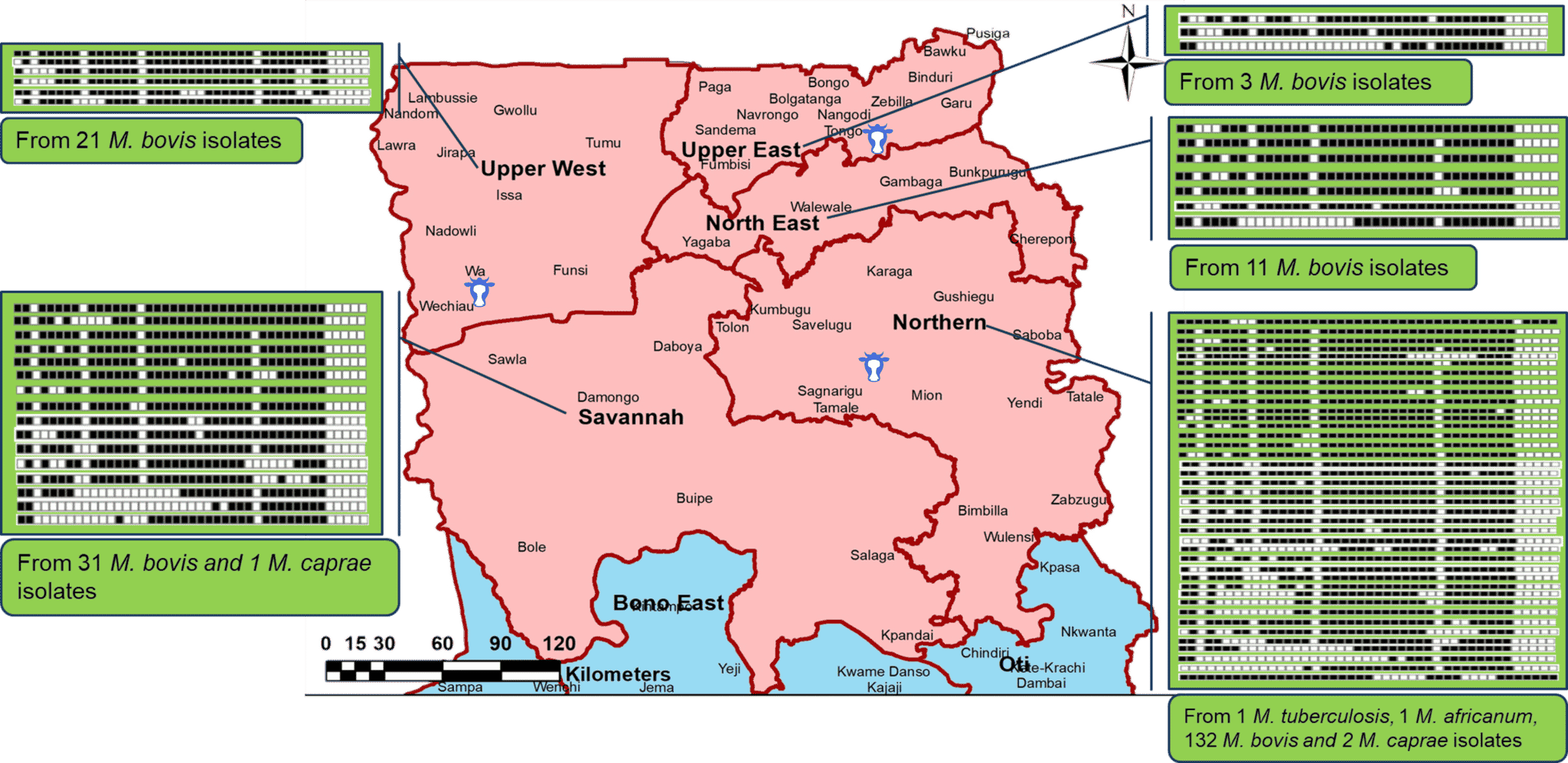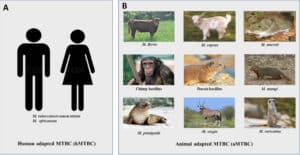One Health Research on Tuberculosis

Project Lead(s)

Professor
Project Background
The Mycobacterium tuberculosis complex (MTBC) consists of two main groups of organisms, the human adapted MTBC (hMTBC) and the animal adapted MTBC (aMTBC). Although each category of organisms are adapted to infecting their unique hosts, as the names suggests, occasionally, there is cross specie infection leading to zoonosis. One of the organisms that is widely involved in zoonosis is the Mycobacterium bovis which causes bovine tuberculosis (BTB). BTB is a disease of global public and animal health significance. The disease is endemic in major livestock producing countries in sub-Saharan Africa. Little or no attention is given to the disease and its impact on livestock and humans. Within the past decade we have been involved in a number of projects aimed at identifying and characterizing aMTBC and tracking zoonotic transmission by adopting a One Health concept.

Our studies have been conducted mainly in Northern and Southern Ghana.
In a cross-sectional study within Southern Ghana, six hundred and eighty-five cattle were screened for BTB using the comparative intradermal tuberculin test giving a crude BTB prevalence of 2.5% among cattle from two dairy farms. We obtained 17 samples from suspected farm animals, 6 (35.30%) of which yielded positive acid-fast bacilli cultures and three of the isolates were identified as MTBC, which were sub-divided into two Mycobacterium tuberculosis sensu scrito (Mtb) and one Mycobacterium africanum; the remaining three were Mycobacterium other than tuberculoisis (MOTT). The study confirmed the public health importance of M. africanum as a pathogen in Ghana.
Also, between 2016 and 2021 we conducted an abattoir-based cross sectional molecular epidemiology study in Northern Ghana spanning the five administrative regions, comprising Upper East, Upper West, North East, Savanna, and Northern region to understand the population structure and distribution of Mycobacterium tuberculosis in cattle and to assess the possibility of zoonotic transmission of the disease to humans. We collected tuberculosis-like lesions from selected cattle organs from three regional abattoirs in the five administrative regions of Northern Ghana and found that about 48% of suspected bovine lesions were positive for Mycobacterium tuberculosis complex (MTBC) with the dominant specie being M. bovis (98%). Within the past decade of our TB research activities in Northern Ghana. We have also isolated at least 17 M. bovis from human clinical samples. Majority of our bovine derived isolates appeared to be uncharacterised suggesting the need for routine tracking and characterisation of the M. bovis species circulating in the sub-region. Comparison of our analysis of the M. bovis from bovine origin to that obtain from human M. bovis from the same geographical area showed 75% (3/4) of the human M. bovis isolates having same molecular pattern with the bovine isolates. Our findings suggest possible zoonotic transmission and highlight the need for BTB disease control in Northern Ghana. To the best of our knowledge, this study is the first to delve deeper into the molecular epidemiology of bovine tuberculosis (BTB) in Northern Ghana. Our findings will not only improve BTB disease control in Northern Ghana but also aid in increased awareness of possible zoonotic transmission in Northern Ghana and the sub-region.
Key Publications
- Acquah, S. K. E., Asare, P., Osei-Wusu, S., Morgan, P., Afum, T., Asandem, D. A., . . . Yeboah-Manu, D. (2021). Molecular epidemiology and drug susceptibility profiles of Mycobacterium tuberculosis complex isolates from Northern Ghana. International Journal of Infectious Diseases, 109, 294-303. doi:10.1016/j.ijid.2021.07.020
- Asante-Poku, A., Aning, K. G., Boi-Kikimoto, B., & Yeboah-Manu, D. (2014). Prevalence of bovine tuberculosis in a dairy cattle farm and a research farm in Ghana. Onderstepoort Journal of Veterinary Research, 81(2), E1-6. doi:10.4102/ojvr.v81i2.716
- Asare, P., Asante-Poku, A., Osei-Wusu, S., Otchere, I. D., & Yeboah-Manu, D. (2021). The Relevance of Genomic Epidemiology for Control of Tuberculosis in West Africa. Frontiers in Public Health, 9(1056). doi:10.3389/fpubh.2021.706651
- Otchere, I. D., van Tonder, A. J., Asante-Poku, A., Sánchez-Busó, L., Coscollá, M., Osei-Wusu, S., . . . Yeboah-Manu, D. (2019). Molecular epidemiology and whole genome sequencing analysis of clinical Mycobacterium bovis from Ghana. PloS One, 14(3), e0209395. doi:10.1371/journal.pone.0209395
Team
External Collaborator(s)
Yolanda Isabel Ayamdooh, Veterinary Services Directorate, Ministry of Food and Agriculture, Tamale, Northern region, Ghana
Eric Agongo Akugre, Veterinary Services Directorate, Ministry of Food and Agriculture, Bolgatanga, Upper East region, Ghana
Omar Abdul Samad, Veterinary Services Directorate, Ministry of Food and Agriculture, Wa, Upper West region, Ghana
Lawrence Quaye, Department of Biomedical Laboratory Sciences, School of Allied Health Sciences, University for Development Studies, Tamale, Northern region, Ghana
Kwasi Obiri-Danso, Department of Theoretical and Applied Biology, College of Science, Kwame Nkrumah
Richard Kock, Department of Pathobiology and Population Sciences, Royal Veterinary College, London
Dr. Bashiru Boi-Kikimoto, Veterinary Division MOFA
Funder(s)
PANDORA-ID-NET
WELLCOME TRUST
CAMBRIDGE-AFRICA ALBORADA FUND




